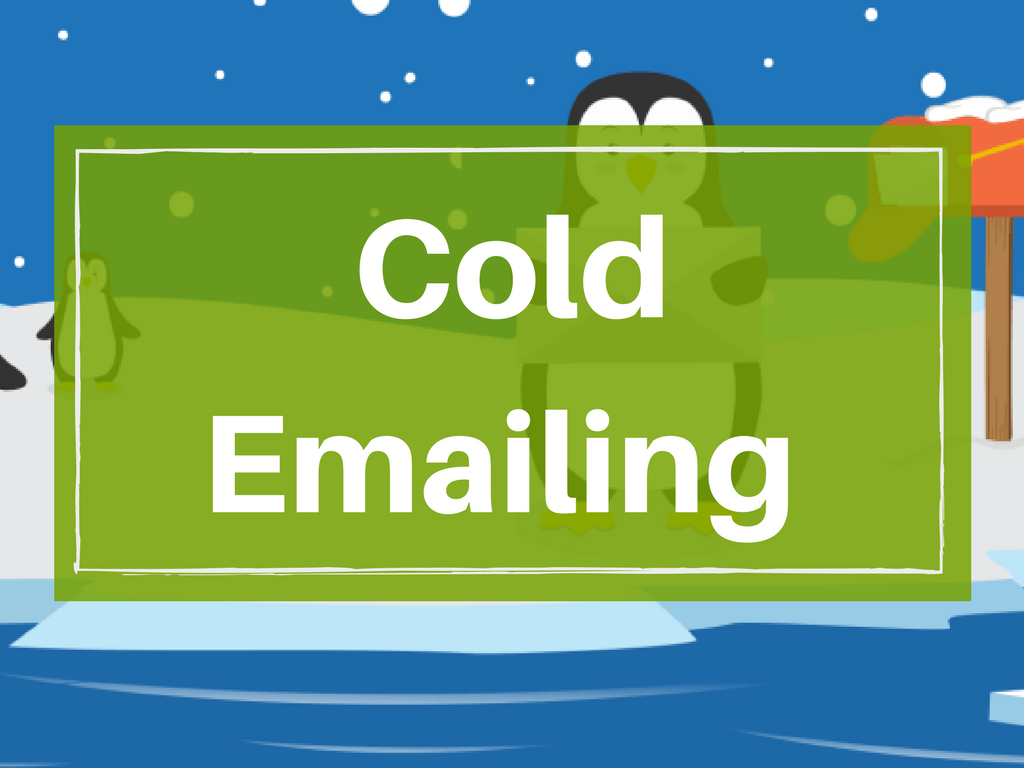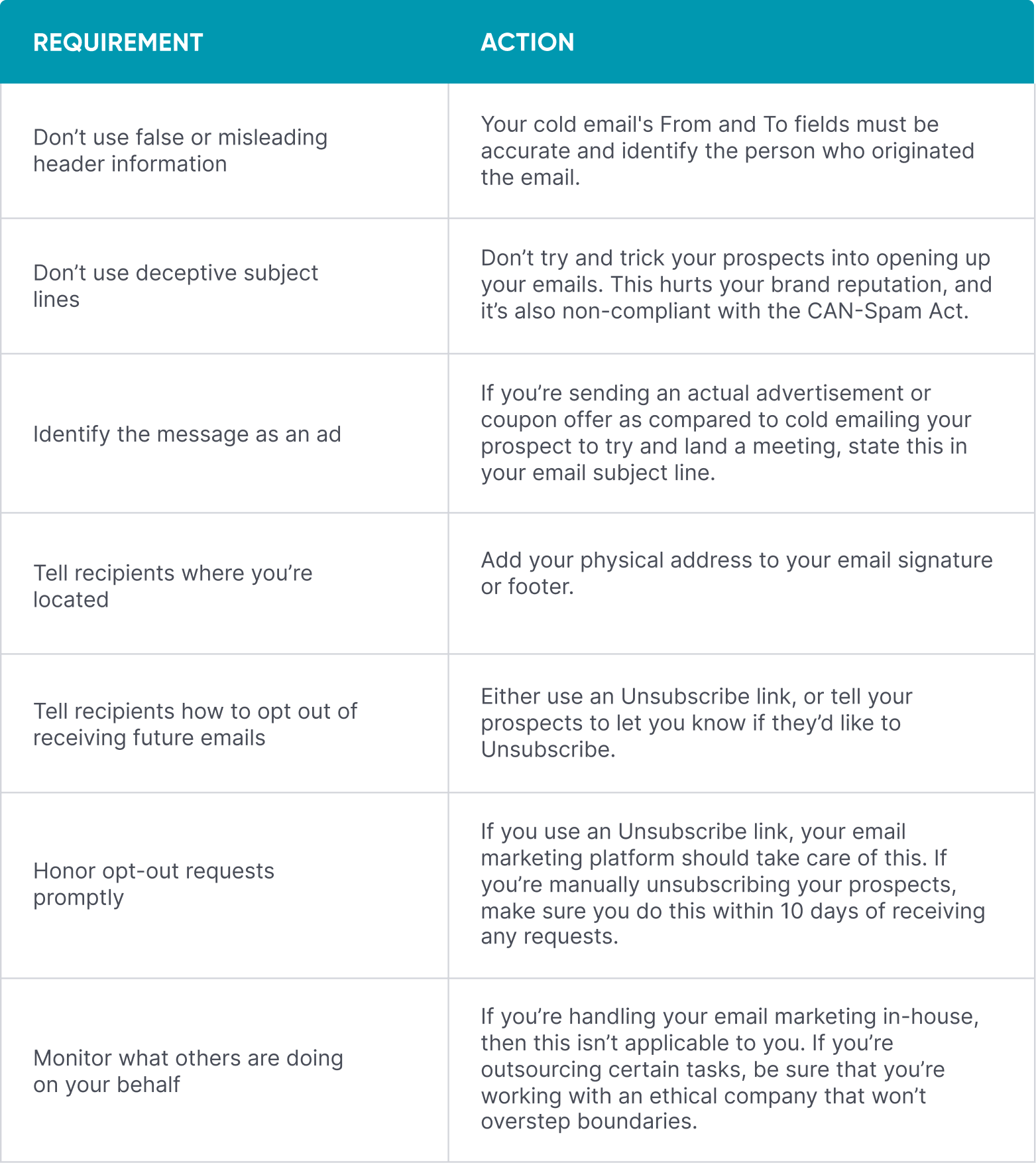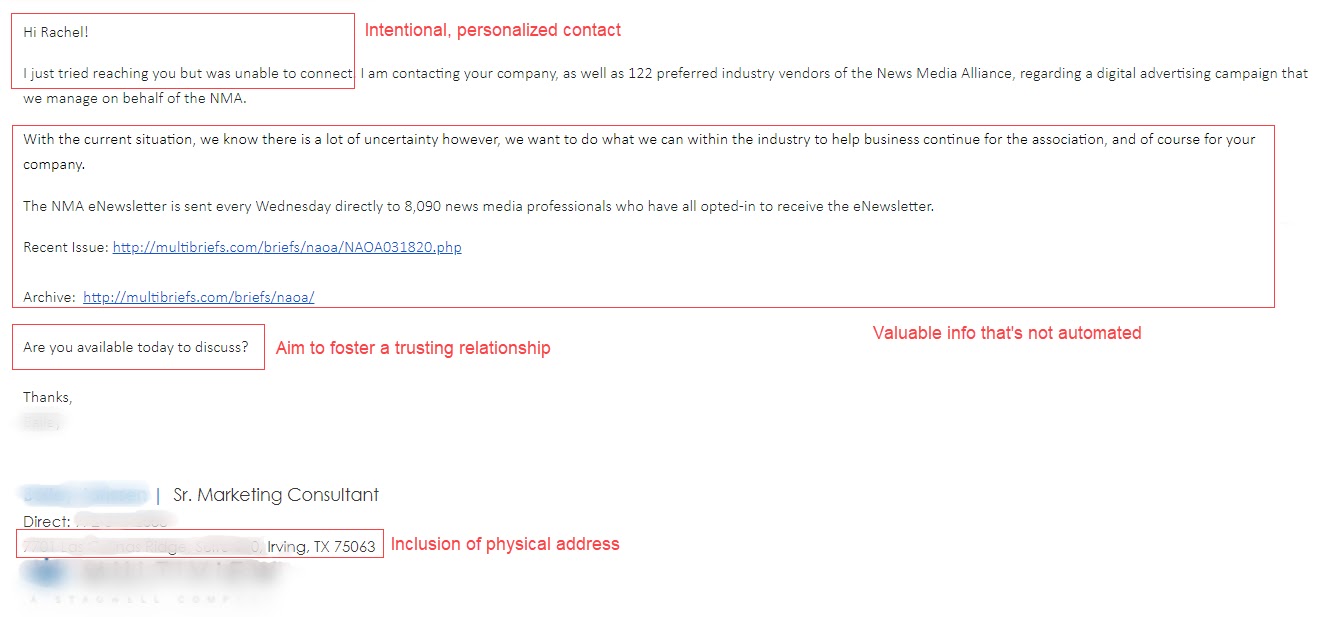Yes, the CAN-SPAM Act applies to cold email marketing. It sets rules for commercial emails, establishes requirements, and gives recipients the right to stop receiving emails.
Cold email marketing can be a powerful tool for businesses. But, understanding the CAN-SPAM Act is crucial. This U. S. Law impacts how you can legally send marketing emails. Non-compliance can lead to hefty fines and damage to your reputation.
In this blog, we will explore what the CAN-SPAM Act entails. We will also discuss how to align your cold email campaigns with this law. Knowing these details can help you run effective and legal email marketing campaigns. Let’s dive into the essentials of the CAN-SPAM Act and its role in cold email marketing.

Credit: coschedule.com
Introduction To Can-spam Act
The CAN-SPAM Act is a U.S. law that sets rules for commercial emails. It establishes requirements for commercial messages. It gives recipients the right to stop receiving emails. It also provides tough penalties for violations. Understanding this law is crucial for anyone engaged in cold email marketing.
Background And Purpose
The CAN-SPAM Act was enacted in 2003. Its main goal is to reduce the spread of spam emails. Spam emails are unsolicited messages sent in bulk. The law addresses deceptive email content. It requires transparency in email marketing practices. The act ensures that recipients can easily opt out of further emails. Violators can face fines of up to $43,792 for each email.
| Requirement | Description |
|---|---|
| Header Information | Must not be misleading |
| Subject Lines | Must accurately reflect content |
| Opt-Out Mechanism | Must be clear and easy |
| Physical Address | Must be included |
Relevance To Email Marketing
Compliance with the CAN-SPAM Act is essential for legal email marketing. Marketers must ensure their emails comply with this law. They need to provide accurate sender information. Subject lines should not be misleading. An easy opt-out option is required. Including a physical address is also necessary.
- Use real names in the “From” field.
- Keep subject lines honest.
- Provide a simple opt-out method.
- Include a real physical address.
Following these rules builds trust. It keeps your campaigns within the law. In summary, understanding the CAN-SPAM Act is essential for successful cold email marketing.
Key Provisions Of The Can-spam Act
The CAN-SPAM Act is crucial for anyone involved in email marketing. It sets rules for commercial emails and messages. This helps protect consumers from unwanted emails. Knowing the key provisions of the CAN-SPAM Act is essential for compliance. Here, we will break down these provisions under specific headings.
Main Requirements
The CAN-SPAM Act outlines several main requirements. First, you must not use false or misleading header information. This includes the “From,” “To,” and “Reply-To” fields. Second, avoid deceptive subject lines. The subject line must reflect the email’s content.
You also need to identify the message as an ad. This can be done in various ways. Finally, include your valid physical postal address. This could be your current street address or a registered P.O. Box.
Penalties For Non-compliance
Non-compliance with the CAN-SPAM Act can lead to serious penalties. Each separate email in violation can cost you up to $46,517. This amount can quickly add up. Both the company and the person who sent the email are held responsible.
Ignoring these rules can damage your reputation. It can also result in legal action. So, understanding these penalties is important. Staying compliant will help you avoid hefty fines and legal issues.
Cold Email Marketing Basics
Cold email marketing is a method to reach out to potential customers who have not interacted with your business before. It involves sending emails to prospects with the aim of building a relationship, generating leads, and ultimately converting them into customers. This approach is effective but requires a clear understanding of rules and best practices, especially regarding the Can Spam Act.
Definition And Benefits
Cold email marketing refers to sending unsolicited emails to individuals or businesses with no prior contact. Unlike spam, cold emails are targeted and personalized.
The benefits of cold email marketing include:
- Building new business relationships
- Generating leads for your sales team
- Reaching a wider audience
- Cost-effective marketing strategy
When done correctly, cold email marketing can be a powerful tool to grow your business. It allows you to connect with potential clients and introduce them to your products or services.
Common Use Cases
Cold email marketing can be used in various scenarios, including:
| Use Case | Description |
|---|---|
| Lead Generation | Identify and reach out to potential clients who might be interested in your offerings. |
| Networking | Build connections with industry professionals and influencers. |
| Partnerships | Explore opportunities for collaboration with other businesses. |
| Market Research | Gather insights and feedback from potential customers. |
Using cold email marketing for these purposes can help you achieve your business goals. Always ensure that your emails are relevant and respectful of the recipient’s time.
Compliance Challenges In Cold Emailing
Cold emailing can be an effective marketing strategy. But, it comes with its own set of compliance challenges. The CAN-SPAM Act sets rules for commercial email. Following these rules is crucial to avoid penalties. Let’s explore some common compliance challenges in cold emailing.
Common Pitfalls
Many marketers fall into common traps. Here are some pitfalls to avoid:
- Misleading Subject Lines: Subject lines must reflect the email content.
- Lack of Clear Opt-Out Options: Every email must have a clear way to unsubscribe.
- Using Deceptive Headers: The ‘From’, ‘To’, and ‘Reply-To’ fields must be accurate.
- Ignoring Legal Disclosures: Include your physical address in the email.
Balancing Compliance And Effectiveness
Balancing compliance with effectiveness can be tricky. Here are some tips:
- Craft Honest Subject Lines: Keep them engaging but truthful.
- Provide Easy Unsubscribe Options: Make it simple for users to opt out.
- Use Clear Sender Information: Ensure all header information is accurate.
- Include Your Address: This builds trust and complies with the law.
By avoiding common pitfalls and balancing compliance with effectiveness, you can improve your cold email strategy. Stay compliant and maintain trust with your audience.
Creating Can-spam Compliant Emails
Creating emails that comply with the CAN-SPAM Act is crucial for any marketer. This act sets rules for commercial emails and gives recipients the right to stop receiving them. Non-compliance can lead to hefty fines. Follow these guidelines to ensure your emails meet all legal requirements.
Required Content Elements
Your emails must include certain elements to be CAN-SPAM compliant.
- Accurate Header Information: The “From,” “To,” “Reply-To,” and routing information must be accurate and identify the person or business who sent the email.
- Subject Line: The subject line should not be misleading. It must accurately reflect the content of the message.
- Physical Address: Every email must include a valid physical postal address of your business. This can be a current street address, a post office box registered with the U.S. Postal Service, or a private mailbox registered with a commercial mail receiving agency.
- Identification: Clearly identify the message as an ad if it is a commercial email. This can be done by including a clear and conspicuous notice that the message is an advertisement.
Opt-out Mechanisms
Providing a clear way for recipients to opt-out of receiving future emails is essential.
- Clear Opt-Out Instructions: Your message must include a clear and conspicuous explanation of how the recipient can opt-out of getting emails from you in the future. Craft a simple, straightforward way for people to opt-out.
- Honor Opt-Out Requests Promptly: Any opt-out mechanism you offer must be able to process opt-out requests for at least 30 days after you send your message. You must honor a recipient’s opt-out request within 10 business days.
- No Charges for Opt-Out: You cannot charge a fee, require the recipient to provide any personally identifying information beyond an email address, or make the recipient take any step other than sending a reply email or visiting a single page on an internet website as a condition for honoring an opt-out request.
Best Practices For Cold Email Campaigns
Creating effective cold email campaigns requires understanding and implementing best practices. These practices help ensure your emails are well-received and compliant with the Can Spam Act. Let’s dive into some essential strategies for successful cold email marketing.
Audience Segmentation
Audience segmentation means dividing your email list into smaller groups. Each group shares common characteristics. This could be based on demographics, interests, or past interactions. Segmentation helps you tailor your messages to each group. Tailored messages are more relevant and engaging. This increases the chances of your email being read and acted upon.
Personalization Techniques
Personalization goes beyond using the recipient’s name. It involves customizing the content based on their preferences and behaviors. Mention their recent activity or interest. Use data to make your email more relevant. For example, refer to a recent purchase or website visit. Personalization makes the recipient feel valued. This increases the likelihood of a positive response.
Monitoring And Maintaining Compliance
Monitoring and maintaining compliance with the CAN-SPAM Act is crucial for cold email marketing. Ensuring your emails meet legal standards protects your business. It also builds trust with recipients. This section will explore key strategies to keep your email practices compliant.
Regular Audits
Conducting regular audits helps identify compliance issues. These audits should review email content, sender information, and opt-out mechanisms. Ensure all emails include a valid physical address. Check that recipients can easily unsubscribe from future emails. Regular audits can prevent costly penalties.
Employee Training
Employee training is essential for CAN-SPAM compliance. Train staff on the importance of following email marketing laws. Provide clear guidelines for creating compliant emails. Include specific examples of compliant and non-compliant emails. Regular training updates keep employees informed about any changes in regulations.

Credit: www.startsmallmedia.com
Future Trends In Email Marketing Compliance
The Future Trends in Email Marketing Compliance are shaping the way businesses approach their strategies. As technology evolves and regulations become stricter, email marketers must stay ahead. This ensures their practices remain compliant and effective.
Emerging Technologies
Emerging technologies are transforming email marketing compliance. New tools help businesses maintain compliance effortlessly. Artificial Intelligence (AI) and Machine Learning (ML) can automatically detect non-compliant emails. They can also suggest improvements to make emails compliant.
Blockchain technology is another game-changer. It ensures the integrity and security of email marketing records. This transparency builds trust with recipients and regulators. Encrypted communications protect sensitive data, reducing the risk of breaches.
Potential Regulatory Changes
Potential regulatory changes could impact email marketing compliance. Governments worldwide are tightening regulations to protect consumers. The European Union (EU) General Data Protection Regulation (GDPR) sets a high standard. Similar laws are emerging in other regions.
The United States may introduce new laws to enhance the CAN-SPAM Act. These changes would require marketers to be more transparent. They must provide clear opt-out options. Penalties for non-compliance could increase, making it crucial to stay updated.
| Technology | Impact on Compliance |
|---|---|
| Artificial Intelligence (AI) | Automates detection of non-compliant emails |
| Machine Learning (ML) | Suggests improvements for compliance |
| Blockchain | Ensures email record integrity and security |
| Encrypted Communications | Protects sensitive data from breaches |
Staying ahead of these trends is crucial. Marketers must adapt to new technologies and regulations. This ensures their email campaigns remain effective and compliant.

Credit: www.uplead.com
Frequently Asked Questions
What Is The Can-spam Act?
The CAN-SPAM Act is a law that sets rules for commercial emails. It establishes requirements for commercial messages, gives recipients the right to stop receiving emails, and outlines penalties for violations.
Does The Can-spam Act Apply To Cold Emails?
Yes, the CAN-SPAM Act applies to cold emails. It requires that emails include the sender’s information, an opt-out mechanism, and a clear subject line.
How Can I Comply With Can-spam In Cold Emails?
To comply with CAN-SPAM, include your valid physical address, provide an opt-out option, and avoid misleading subject lines. Ensure you honor opt-out requests promptly.
What Are The Penalties For Violating The Can-spam Act?
Penalties for violating the CAN-SPAM Act can be severe. Each separate email in violation is subject to fines up to $43,280.
Conclusion
Understanding the CAN-SPAM Act is crucial for cold email marketing. Compliance avoids hefty fines and builds trust. Ensure your emails are clear and respectful. Always provide a way to opt-out. Keep your sender information accurate. Following these guidelines benefits your business and maintains a good reputation.
So, practice ethical email marketing.



Leave a Reply